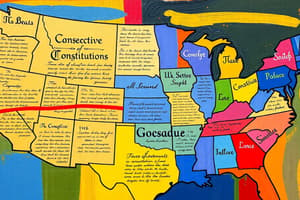Podcast
Questions and Answers
What does the 13th Amendment prohibit?
What does the 13th Amendment prohibit?
- Prison labor under any circumstances
- The ownership of property by individuals
- Slavery and involuntary servitude, except as punishment for a crime (correct)
- All forms of servitude
Which amendment granted Congress the power to levy income taxes?
Which amendment granted Congress the power to levy income taxes?
- 14th Amendment
- 16th Amendment (correct)
- 18th Amendment
- 24th Amendment
Which amendment specifically extended voting rights to women?
Which amendment specifically extended voting rights to women?
- 26th Amendment
- 19th Amendment (correct)
- 24th Amendment
- 15th Amendment
What does the 14th Amendment primarily define?
What does the 14th Amendment primarily define?
What limitation does the 22nd Amendment impose?
What limitation does the 22nd Amendment impose?
Which amendment allows for the election of senators by popular vote?
Which amendment allows for the election of senators by popular vote?
What is prohibited by the 24th Amendment?
What is prohibited by the 24th Amendment?
What change does the 25th Amendment address?
What change does the 25th Amendment address?
Flashcards
13th Amendment
13th Amendment
Outlaws slavery and involuntary servitude, except as punishment for a crime.
14th Amendment
14th Amendment
Defines citizenship rights, including Equal Protection and Due Process.
15th Amendment
15th Amendment
Grants voting rights regardless of race.
19th Amendment
19th Amendment
Signup and view all the flashcards
20th Amendment
20th Amendment
Signup and view all the flashcards
22nd Amendment
22nd Amendment
Signup and view all the flashcards
26th Amendment
26th Amendment
Signup and view all the flashcards
16th Amendment
16th Amendment
Signup and view all the flashcards
Study Notes
Constitutional Amendments Summary
-
1st Amendment: Restricts federal courts' power, safeguarding states from lawsuits by residents outside their borders.
-
12th Amendment: Specifies the presidential and vice-presidential election process.
-
13th Amendment: Abolishes slavery and forced labor, except as legal punishment for crimes.
-
14th Amendment: Defines citizenship rights, ensuring equal protection and due process under the law.
-
15th Amendment: Guarantees voting rights regardless of race.
-
16th Amendment: Authorizes federal income tax collection.
-
17th Amendment: Establishes popular election of senators.
-
18th Amendment: Prohibited the manufacture, sale, and transportation of alcohol.
-
19th Amendment: Grants women the right to vote.
-
20th Amendment: Specifies presidential and congressional term beginnings and succession procedures.
-
21st Amendment: Repealed the 18th Amendment, allowing states to control alcohol regulations.
-
22nd Amendment: Limits presidents to two terms in office.
-
23rd Amendment: Provides the District of Columbia with presidential electors.
-
24th Amendment: Eliminates poll taxes as a prerequisite for voting.
-
25th Amendment: Details presidential and vice-presidential succession.
-
26th Amendment: Extends the right to vote to citizens 18 years of age or older.
-
27th Amendment: Prevents congressional salary adjustments from taking effect until the next election cycle.
Studying That Suits You
Use AI to generate personalized quizzes and flashcards to suit your learning preferences.




